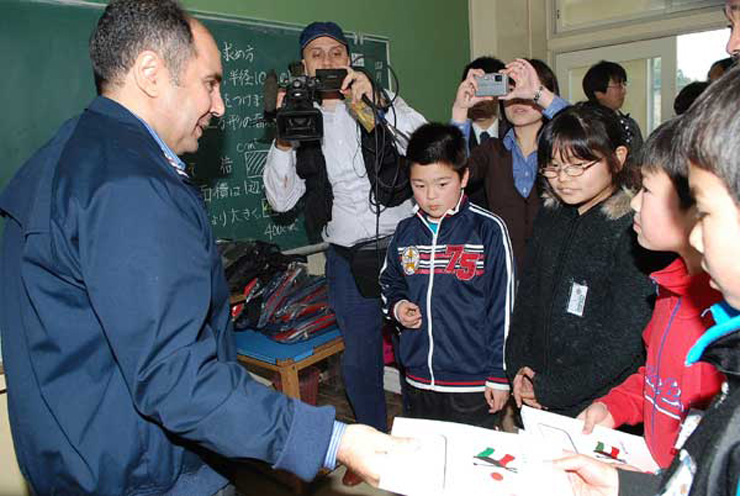4/30/2011
Japan tsunami-hit children receive Kuwait''s symbolic soccer balls, supplies
Kuwaiti Ambassador to Japan Abdulrahman Al-Otaibi and First Secretary Mohammad Al-Mutairi visited Kesennuma City in northeastern Japan over the weekend to show Kuwait's solidarity with survivors from the March 11 disaster.
The top diplomat delivered soccer balls, school supplies, food and living necessities on behalf of the government and the people of Kuwait. With two countries' national flags painted, specially-designed 240 soccer balls were chosen to give children here a hopeful future in the aftermath of the catastrophe. Al-Otaibi's visit to the coastal city of Kesennuma, which took more than six hours from Tokyo, was accompanied by the First Secretary Mohammad Al-Mutairi, renowned former Japanese national team football player Tsuyoshi Kitazawa and a Foreign Ministry official. The badly-hit Kesennuma City in Miyagi Prefecture, 390 km north of Tokyo, had a population of 74,000 as of the end of February, of whom about 2,000 are listed as dead or missing from a magnitude 9.0-earthquake and an ensuing tsunami. Up to 5,700 survivors are still living in emergency shelters as they lost homes and loved ones.
During his talks with the ambassador, city mayor Shigeru Sugawara expressed his gratitude to Al-Otaibi for his visit and conveyed appreciation to Kuwait for offering symbolic soccer balls and other gifts to suffering local residents, especially children. "We were touched by the solidarity extended by the government and the people of Kuwait," Sugawara said. "Giving soccer balls is a great idea. I believe they will make children unite and remember Kuwaiti friends," he added. According to Sugawara, the waves of the tsunami reached up to the second floor of Minami Kesennuma Elementary School building. "All students in the building managed to flee to the higher floor, but houses of most of the children were destroyed or damaged. As a new academic year has just started, many students moved to other cities to continue studies, and those who left behind feel lonely." Eight children became orphans and about 80 others lost a parent in Kesennuma, a city official said, adding that all the eight orphans were taken care of by their relatives.
The mayor also briefed the diplomat on the destruction in Kesennuma. A massive tsunami submerged 18-square km of land and bursting of all the 23 seaside oil storage tanks made an extensive area into "a sea of fire." He also explained how his government is supporting the recovery process of the city, which is well known for its industries. "Our priority is to revive this once beautiful city. The reconstruction plan is underway and I hope Kuwait will share its experience with us," the mayor told Al-Otaibi. Meanwhile, Sugawara said Kuwaiti citizen Abdullah Mudhafar is the most famous foreigner in Kesennuma, showing his amazement with Mudhafar's commitment to child education and volunteer activities here.
"Local people already have a feeling of closeness towards Kuwait, and your visit today and delivery of gifts to schools and shelters will further deepen our bond," the mayor said. The Kuwaiti government evacuated Mudhafar and his family in March after his house was smashed by the disaster.
For his part, Al-Otaibi told Sugawara, "On behalf of the people and the government of Kuwait, I extend my heartfelt condolences to those bereaved as well as my sincere sympathy to all affected by this catastrophe and to their families and friends." The ambassador also highlighted Kuwait's decision to donate 5 million barrels of crude oil to Japan upon directives of H.H. the Amir Sheikh Sabah Al-Ahmad Al-Jaber Al-Sabah, in which the mayor showed appreciation. The donation, equivalent to some USD 550 million, surpasses Japan's daily consumption of 4.4 million barrels. "The scale of the destruction was breathtaking, but I am convinced that your city and Japan will bounce back from this tragedy. Small gifts we brought today are just the first step. Please let us know what are needed for suffering people," Al-Otaibi pledged the mayor Kuwait's fullest support.
Prior to the talks with the mayor, the ambassador paid visits to Minami Kesennuma Elementary School, Kesennuma Junior High School and two evacuation centers. He also met city's Superintendent of Education Board Katsumi Shirahata and expressed sympathy for the plight of local residents. In a classroom at Minami Kesennuma Elementary School, 25 children in the sixth grade were excited to see the ambassador and to receive soccer balls, notebooks, school bags and other items bearing the two countries' names. Warmly encouraging children, the ambassador said, "Please remember that our hearts are with you, and your friends in Kuwait and all over the world stand by you. I believe all of you will contribute to the reconstruction of Kesennuma in the future." The students, most of them had their houses severely damaged, were also delighted by the presence of star player Kitazawa and broke out cheering when he demonstrated football skills. Carrying a photo of her late friend Moe Suzuki in her hands, 11-year-old Miyu Watanabe said :-, "Suzuki perished in the tsunami on March 11. She was very active, and I'm sure she would share this joy with us if she were here." At the makeshift shelters, Al-Otaibi consoled survivors and offered food and daily necessities, and in return, they expressed appreciation to the ambassador, saying they were touched by the gifts from Kuwait.
Touring residential areas along the tsunami-ravaged coastline, where countless houses, buildings, ships and cars were destroyed, the ambassador expressed shock at the level of devastation. "It was a scene of incredible tragedy, even I have seen the images on TV so often. But with their strength and dignified spirit, I believe the Japanese people will rebuild the nation and will be stronger than ever," he told KUNA at the end of the visit. "I hope our visit and delivery of gifts from Kuwait brought joy to children and encouraged survivors in this time of hardship," he added.
The twin natural disaster left nearly 28,000 people dead or missing in northeastern and eastern Japan.




